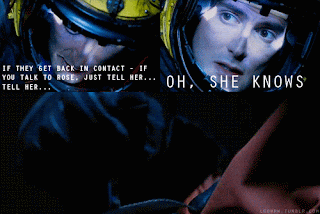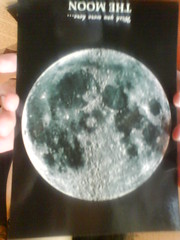
So where were we? Oh yes, I was blogging from our hotel in the Sydney Rocks, while the Dr was exploring the roof-top hot-tub. I went up to join her and we enjoyed the view, choosing to ignore the ominous low and dark cloud out to sea.
This proved to be a mistake as it meant that as we went out to meet
Dr Who author Jonathan Blum for tea in Darling Harbour, I was only wearing Birkenstock flip-flops, shorts and tee-shirt. And so got soaked when the heavens opened. There was thunder. There was lightning. There was a river of water higher than the pavement. There was me and the Dr diving into a posh wine bar, looking like drowned and under-dressed rats, texting Jon to come join us.
He did, and when the sky had cleared he took us squelching for tea in Darling Harbour. I had a pizza and shared a bottle of fizz, and we talked a bit of shop and to Jon’s wife
Kate Orman by phone, and then me and the Dr squelched back to our hotel, cold and damp but well-fed.

The next day was a bit over-cast, but we explored the Rocks and took pictures. Again we were struck by the Manchester-ness of the lower-tier architecture, with sparkly skyscrapers behind.
Not that I'm sure the photo right really shows that adequately. You'll just have to take my word for it.

We nosed round the observatory that’s so very like the one in Greenwich – though they call the time-keeping bollock on the roof a “time ball”.
Bought a postcard of the upside-down Moon.
Thence a long walk to Darling Harbour again for pancakes with Jon, followed by a trek round the
Maritime Museum. The Dr dared suggest it’s better laid out and interpreted than the one she used to work at herself, with plenty of personal stories and artefacts to bring the Big Ships And Stuff to life.
Just time for a beer in
Edinburgh Castle (a pub) before the train back to the airport, and we got back to Melbourne in time for me to grab a quick beer with the sister’s boyfriend.
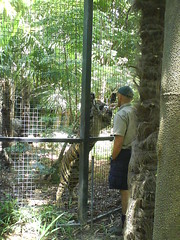
On Thursday, I managed to cock-up the trams to
Melbourne Zoo, but we got there eventually. Had a great afternoon of cooing at the creatures and taking photos. The highlight was probably seeing the smallish, cuddly-looking Sumatran tigers getting fed. The keepers poked a syringe of milk through the gaps in the fence, and the tigers lapped away like little kittens. They had to chase the syringe as the keepers moved it around, and they were then touching the tigers’ paws as they poked them through the fence. Just the game I play with the Dim Cat at home through the banisters.
Also good were the apes:
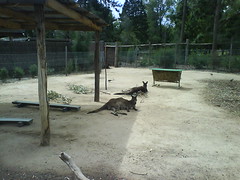
The zoo is laid out in regions, so the tigers and apes from East Asia are amongst Asian trees and buildings, while the marsupials are all in a bit that feels very outback. The koalas hid in the tree and it’s illegal in Victoria for people to handle them anyway, so I didn’t take any pictures. The wombats were all cuddled up in the dark, looking snug and comfy. Again I couldn’t get pictures of them.
Then we trammed back into town and made our way to the
Ian Potter Centre. There were fun exhibits of aboriginal artworks and a thing on black in fashion which was very goth and the Dr. Then there was pizza, and we bumped into the sister’s boyfriend again by chance, who spared time for a chat as I accompanied him up to the bike shop.
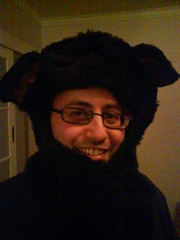
In the evening, me and the English girls (the Dr, the sister and
Erykah) descended en mass on poor old
Ian and Mrs Mond for wine and
clever bloody Joe Lister on the telly. Couldn’t have been a better last night in Oz, with splendid company and many laughs. Ian even showed us the Wicket T Warwick costume he’d been made to wear on his stag do.
Up early Friday for a very long flight to South Africa, where again I didn’t fit. My auntie met us at the airport, and explained the various things we were driving past on the way back to her house. She dealt very well with what were probably two zombies. I was much tickled, though, that they call traffic lights “robots” – and didn’t know that it’s the
Czech word for serfdom.
On Saturday, the auntie and uncle laid on
an extraordinary trip round Soweto, with local guide Ken Dalgliesh. No, not the one I used to have a poster of. He’s studied and written on the history of the collection of townships that now has a population of 4.9 million, and is also up to his eyeballs in projects to help and support the poorer bits.
So we went to the market opposite the Hani-Baragwnath hospital, biggest hospital in the southern hemisphere, and the Dr and I braved the protein-rich
mopane caterpillars that are a local stable. Past the chicken stranglers and heaps of freshly butchered, fly-covered meat, we ventured into a shebeen (pub) to share a carton of the yeasty, frothy Jo’Burg beer which was home-brewed in the days of Apartheid, when the locals were not allowed the “white man’s” beers. It’s thick, heavy, low-alcohol stuff that reminded me a lot of freshly-squeezed milk. The locals seemed very interested in my hat.
We toured through the various areas of the townships. After the fall of Apartheid, the inhabitants were given the plots of land on which they had their small and basic shacks. In the posher bits, they’ve since extended and enhanced these basic facilities, so you’ll see lavish properties and exquisitely manicured gardens bolted on to the side of a crude oblong of breeze blocks. I assume this juxtaposition is better than demolishing such a reminder of their history, and also serves to show how far the inhabitants have come – and in such a short time.
The aunt and uncle were most surprised by the low walls and lack of armed guards and electric fences that are everywhere in their bit of town. Only recently one of their friends was bound, beaten and robbed by a gang described as “militant”. Incidents like that seem pretty regular, too – they and horrendous car crashes are talked about in the way we might talk of a bad morning on the Tube.
Perhaps Soweto is just a safer, happier place with less divide between the well-off and poor. Or perhaps it has always been self-policing, so that no one would dare risk being caught stealing or anything else. I assume we only saw the tourist-friendly bits of Soweto anyway.
But our tour did include the poorer bits, and we stopped off at a community centre (oddly, built by an American basketball charity) which our guide Ken was very involved with. The smiley, happy children hanging out there quickly threw together a performance of dancing and singing, and were keen to get us dancing too. It was all so impromptu and lively. We also met the old lady who has run the place since its most basic beginnings back in 1954. She’s still the one everyone goes to when approving any new developments or projects.
The main part of the tour, though, was following the route of
the march on 16 June 1976, when schoolkids with an average age of 13 protested at having to be taught at least 50 percent in Afrikaans – a language they and many of their teachers did not even speak. The subjects chosen to be taught in Afrikaans were history, geography and mathematics, further disenfranchising the country’s black majority. The kids acted independently of their parents, who they saw as subsumed into the Apartheid regime because they accepted it. And in the Catholic church where many of the kids first assembled that morning, we counted the bullet holes in the ceiling and saw the broken edge of the altar where the camo-wearing South African police had tried to scare them off.
The kids were not scared off, and we followed the route to Vilkazi Street where the police dogs (or, some sources say, a single dog) were set on them. The dog was killed, and then the police started firing into the ranks of children…
One boy,
Hector Pieterson, was shot in the back, and a photo of his wounded body being carried by another boy came to embody the massacre. The picture (see the last link) is a classic “pieta” in structure, a tragic emblem that fuelled a tide against the regime. But our guide, though understanding this focus, was keen to acknowledge the other 20 people who died that day – not all of them black – and to talk of the wider context.
We stopped at Vilkazi Street to see the memorial to Hector, and then to the larger memorial with a
museum to one side. The museum was full of different perspectives and ideas, if a little text-heavy. It was an intensely moving, fascinating place – so much so that the Dr was quite quiet for the rest of the evening. Seeing it makes it all the more remarkable that the fall of Apartheid didn’t descend into a bloodbath. Those we spoke to all credited that to Nelson Mandela; and they expressed concern that there was still the risk of major violence. There was much discussion (not all of which I followed) about how the
BEE policy, despite its best intentions, had widened, not helped, an epidemic skills gap in the country. They await the forthcoming elections with some anxiety.
In the evening we went out to a place near to where my aunt and uncle live for some food. And again it messed up our preconceptions and prejudices about the place. There was a mix of white and black people there, and me and the Dr were both struck by how much more integrated Johannesburg is than either Australia or LA, where the races seemed to much more stick to their own. Even the airport at Johannesburg had hefty tomes trying to reconcile the past (including a book by the Dr’s PhD supervisor); we saw no acknowledgement at all in LA or Australia of their own contributions to racial history. But then I also can’t see the UK producing anything so self-critical on, say, the history of Northern Ireland.

On Sunday, we had a two-hour trip to the 55,000-hectare
Pilanesburg game reserve to the north of Johannesburg and spent the day spotting real, wild hippos, giraffes, impalas, zebras, wildebeests, warthogs and what could have been a crocodile but could have been a log. The aunt and uncle apologised for us not seeing rhino and elephant, but we were very happy.

I tried to explain the astonishing vastness of the landscape, like the horizon has been extended twice as far. Various people have told me that once you’ve lived in Africa it gets into your blood, and the mother-in-law still hankers for the continent some 30 years after she left Kenya. I can sympathise. There’s something rich and potent about the brick-red soil, the hugeness of space with its wealth of animals and under the soil in gold and platinum. I guess human beings evolved to best fit this landscape, this climate, this altitude and everything else. We’re already making plans to go back, to see more…
Odd thing. The toilets at the park all offered free condoms. The toilets at Melbourne Zoo had special boxes for disposing of needles. Not sure what this signifies.
My cousin G. took us to a bar in the evening, and made us feel old by not knowing that the Rolling Stones’ “Paint it Black” was more her mother’s generation than mine. I managed three bottles of Castle beer before we were back to the house for a fantastic spread of spare ribs and some kind of sweetcorn bake.
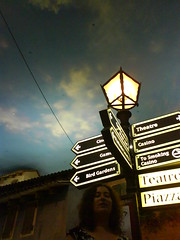
A quiet day Monday, though we visited the barking mad shopping centre / casino of
Montecasino. The whole place is made out like an Italian town, and even the trees and ducks in the river are fake. The ceiling is painted so that half of it’s in “daylight”, the rest at “night”, and I can see when it’s really hot outside it makes sense to hang out in a place like this. But with the constant piped pop music and everything a sell, I was wanting to break out after five minutes. My uncle said it was like the village in
the Prisoner – like this was a good thing.
The dire warnings about not bringing your guns into the place, and the security check to get through the door, made me ask about guns in the country. Apparently it's a major problem - people getting shot for beeping bad driving or just for being in the wrong place. Driving is mad too - you don't step on the gas when the lights go green, you pause to let people jump the lights. And the taxi drivers have to be seen to be believed.

After a bit of shopping and chasing the dog round the garden, we made our way to the airport. Plane was two hours late because they’d loaded the wrong baggage on the plane. And then the holiday was all over.
In the taxi from Heathrow, as we got caught up in the tailback behind an accident in Chiswick, I thought how small and squished up the road signs and roads and horizon all seemed. And how pale and cold and unambitious the weather seemed. And how relieved I was to get home and to sleep.
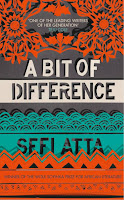 Deola Bello works for a company in London that audits charities and NGOs around the world. She arranges one assignment so that she'll be back in Nigeria in time for the fifth anniversary of the death of her father. But facing her extended family means a whole load of questions - about what she's doing with her life, what she wants and where she belongs...
Deola Bello works for a company in London that audits charities and NGOs around the world. She arranges one assignment so that she'll be back in Nigeria in time for the fifth anniversary of the death of her father. But facing her extended family means a whole load of questions - about what she's doing with her life, what she wants and where she belongs...









